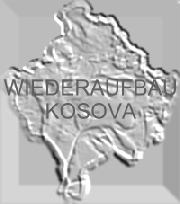Inhalts-Verzeichnis
Kosovo + Kosova = Kosov@
werden vermittelt bei

http://www.osnabrueck.
netsurf.de:8080/~dbein/
wiederaufbau.htm
|
Inhalts-Verzeichnis |
||
|
Kosovo + Kosova = Kosov@ |
werden vermittelt bei 
http://www.osnabrueck. netsurf.de:8080/~dbein/ wiederaufbau.htm |
|
First Donors' Conference for Kosovo : ConclusionsLink to new albanian map of Kosova Link to detailed new map of Kosova 197 KBBrussels, July 28, 1999
SOUTH EASTERN EUROPEReconstructing Kosovo
First Donors' Conference for Kosovo : Conclusions
Brussels, July 28, 1999High level officials from more than 100 donor countries and international organizations met in Brussels on Wednesday 28 July 1999 for a first donorís conference on Kosovo.
The meeting was co-chaired by F. Lamoureux, Deputy Director General, European Commission, and J. Linn, Vice President, Europe and Central Asia Region, World Bank. The delegation of UNMIK consisted of Mr. J. Dixon, Deputy Special Representative for reconstruction and development, and Mr. D. Mc Namara, Deputy Special Representative for humanitarian assistance.
This conference started the process of mobilizing funds for the reconstruction and the development of Kosovo. The discussion took place on the basis of a preliminary survey of identifiable physical damage. A more comprehensive assessment of needs and priorities for assistance will be completed in the coming months. The conference focused on meeting outstanding urgent humanitarian financing needs, winterization of housing, as well as restarting the economy, and building up a local civil administration under the auspices of UNMIK-the UN interim administration for Kosovo.
Donors were updated on the various damage assessments currently underway and on the rapidly evolving situation in Kosovo, including the faster than expected refugee return and the changing security situation. Specific attention was asked to be given to priority reconstruction needs and institution building in preparation for a pledging conference to be held in October 1999. The process of donor conferences will continue.
Donors expressed their appreciation for the work done by KFOR to restore security in the country and for its contribution in meeting urgent needs in several areas, including humanitarian assistance, priority reconstruction, and provision of basic public services. They recognized that these tasks have to be taken over progressively by the civilian administration under the auspices of UNMIK.
A more accurate figure for the global costs of reconstruction, peace-implementation and recovery will be possible in October 1999 at the next Donor Conference. Todayís conference focused on the most urgent humanitarian and budget needs.
Urgent financial requirements were estimated as follows:
- US$45 million to cover the budgetary deficit presented by UNMIK
- US$200 million to cover immediate basic needs identified by UN agencies
- Euro300 million as the immediate requirements for reconstruction estimated by the EC on the basis of the first damage assessment presented at the conference.
- Pledges made at the conference added up to a total of US$2.082 billion, including funding already disbursed during 1999.On behalf of UNHCR and UNMIK, Mr. Mc Namara, presented the urgent humanitarian needs for Kosovo. This includes essential assistance for displaced or conflict affected people and preparation for the winter in particular to ensure suitable accommodation and food security for all Kosovars, education for children in early fall, and the delivery of basic health services. The Humanitarian Office of the European Community (ECHO) underlined the high quality of cooperation with UNHCR on the ground and in the assessment of needs.
Donors agreed on the immediate needs assessment for Kosovo and agreed that the so-called "consolidated Inter-Agency Appeal" for Southeast Europe deserved support. Donors pointed to the need to ensure a proper transition from humanitarian assistance to aid for development and reconstruction in order to avoid duplication of effort.
The need to secure appropriate financing for current expenditures, including salaries, of the local public administration and public utilities was underlined by J. Dixon of UNMIK. Donors shared the view expressed by Mr. Dixon that the immediate building-up a local administration is of utmost importance. An interim budget covering the period until 31 December 1999 was presented and Donors were encouraged to pledge budgetary support through the UN Trust Fund set up for this purpose.
Donors welcomed efforts by UNMIK to re-establish tax and customs collection at the border with EC assistance and to put in place sound budgetary procedures. The need to avoid distortions between salaries paid by the local administration and salaries paid by international organizations on the ground to local agents was also underlined by UNMIK and several major donors.
Donors also shared immediate priorities identified by UNMIK in liaison with the IMF and the World Bank to create an environment conducive to private economic activities. This includes, in particular, the resolution of basic property rights, regulation of banking and finance, clarifying conditions for foreign trade and setting up simple procedures for company registration.
With regard to implementation, donors in particular noted the decision by the EU to establish an Agency for Reconstruction and the prompt setting up of the precursor Task Force in Pristina. Donors welcomed the intention of UNMIK to develop together with the European Commission, the World Bank and the IMF, in liaison with other financial institutions, a comprehensive development and reconstruction strategy. An initial strategy will be presented to donors in October 1999 covering priority needs in 2000 and beyond. Donors recommended that program and project co-ordination take place through sector task forces led by a key agency involved in the relevant sector.
Donors expressed satisfaction that the European Commission was able to present at this early stage an assessment for damage to housing and local infrastructure. They welcomed the proposed extension of this study to cover productive infrastructure. Donors encouraged the Commission to maintain close co-ordination with institutions which are willing to take a leading role in the concerned sector.